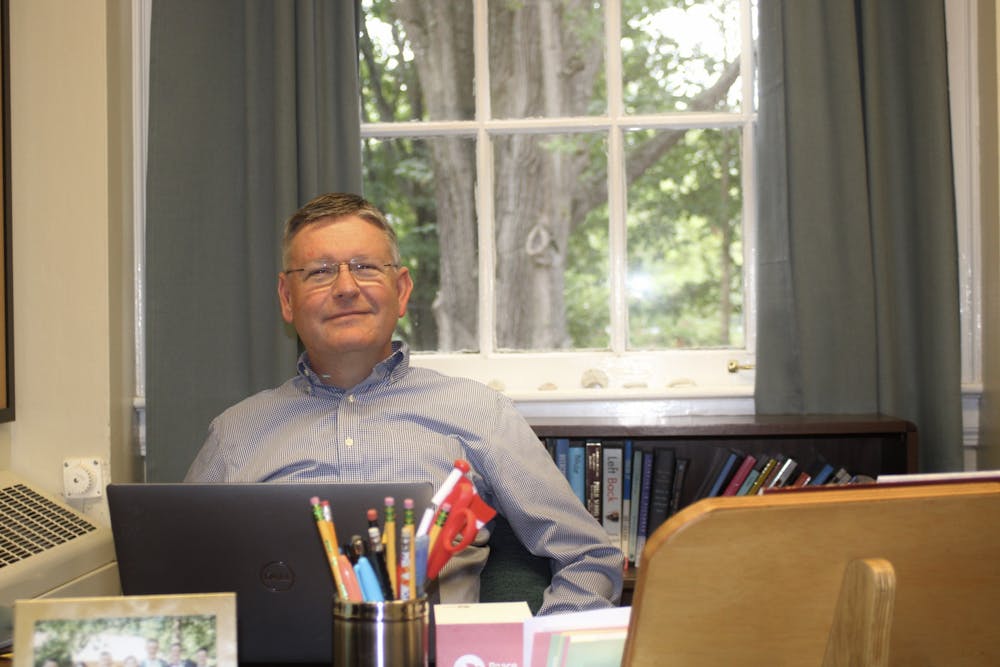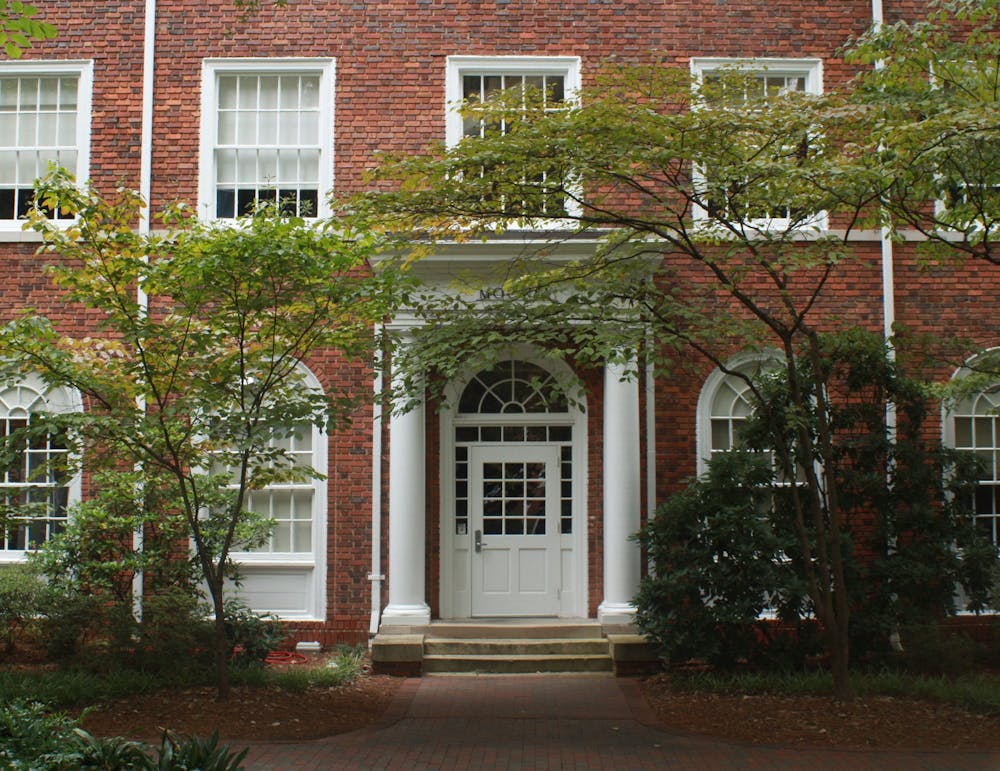Updated as of 1:44 p.m. on Oct. 17 to include more context from Elon students.
Following concerns about the Alamance-Burlington School System mold problems and high rates of teachers quitting their jobs, senior education major Ally Shibata said she has doubts about entering the field of teaching due to burnout.
“It is scary knowing that, before I even start my career, I’m at risk of burning out at that career,” Shibata said. “It’s hard thinking I’m spending so much time, energy and money here at Elon getting a degree for something that might not even be a lifelong career.”
Shibata teaches part-time at Central Park School for Children in Durham. She said she often feels flustered as a student teacher, and balancing an education along with a college social life she feels is already difficult
“‘My friends will call me and say ‘Let’s go out on Thursday night' and I have to wake up at 6 a.m. the next morning,’” Shibata said.
K-12 workers showed the highest rates of burnout of all professions in the U.S., according to a 2022 Gallup Survey. Gallup, a global analytics firm, found that 52% of teachers felt consistent burnout in their jobs.
Junior Rachel Maccini said she is passionate about special education and middle-grade teaching, and said she wants to be a teacher to help people who can’t help themselves.
“A lot of times it's not something you can prepare for,” Maccini said. “You can student-teach all you want, but you can't prepare for the rest of your life having people rely on you every single day.”
According to a McKinsey and Company survey, the post-pandemic era of teaching has resulted in high rates of teacher attrition, and the reduction of teaching staff on a large scale across the country. The report, published March 2023, states nearly one-third of K-12 teachers are considering leaving their jobs.
Within the community, ABSS has been under scrutiny this year for mold problems and low testing rates.
Maccini, who taught at Western Alamance Middle School, said her assigned classroom teacher that she assisted switched districts because she was overwhelmed.
“She was overworked because she was special ed and she had a lot of students on her caseload that she couldn’t handle,” Maccini said.
Maccini said she enjoys student teaching and remains excited to enter the field, but also said that the profession has a stark give and take relationship.
“I don’t know if it can be improved. It is something you have to love,” Maccini said.
At Elon, professor of education Stephen Byrd said he wants to focus more on educating his students about the possibilities of burnout, as he has faced the problem himself.
“It’s not a condition you can just recover from in a day. It takes time,” Byrd said.

Having experienced burnout himself, Elon University education professor Stephen Byrd advocates that his student-teachers have a clear work life balance.
Byrd is a former K–12 educator and an Elon professor of roughly 20 years. He said burnout is important to discuss with students if they plan on being teachers. He said he focuses on burnout while educating so that students can be as caring and resilient as possible.
“There is only so much that you can give,” Bryd said.
Recently, Byrd said he has been focusing on burnout, compassion and fatigue in his research. He also said that teachers are often too compassionate and susceptible to "the cost of caring."
Special education teachers are more susceptible to burnout, according to Byrd, because they are pouring out their emotions of the time.
Byrd said caring professions such as nurses, first responders and health workers could also suffer from compassion fatigue. The unchecked, constant caring, Byrd said, could leave teachers hardened and unresponsive.
“If you are a caring person, you really want to do a lot for somebody — emotionally and psychologically,” Byrd said. “If the goals that you have for the person are not being met, you can end up losing hope.”
According to Byrd, maintaining boundaries with students and keeping a healthy work-life balance is the best way for students to prevent burnout.
“In the digital age, being a teacher is harder than ever,” Byrd said. “It is harder to set boundaries for yourself and others. … I think that is where some teachers have a tough time — where is it okay for them to draw the line and put up boundaries?”
Bronwyn Harris, a professor of education at Elon, worked as a K-12 educator in North Carolina schools for most of her teaching career. She said she experienced strong burnout during that period of her life, and that it is an important topic of discussion with students.
During her first year teaching, Harris said she was already overseeing all of the curricular decisions made by the school. She said as a new teacher, she felt she had to prove herself and took on more than she could handle.
“Staying late is admired. In the profession, people assume you are doing a good job because you stay late,” Harris said.
Harris also said that while teaching is a rewarding profession, it can take a toll on one’s mental health.
“I would get home late and tell my husband that I just needed an hour to myself,” Harris said. “I’m sure that happens to other people in other jobs, but it was happening day after day.”
Harris said burnout's effect on her relationships has been an important aspect in her life. She said that her husband likes telling a story about being unable to propose to her one night.
“He was going to propose to me one night. I told him, ‘No I’m sorry, I just need a second.’ He had planned this whole thing but I just couldn’t engage with him right then,” Harris said.
For Harris, she said the most difficult part of teaching was the highly social and emotional nature of the job. In terms of the workload, she also said she would often have no time between classes to grade papers or answer emails.
“You have to be ‘on’ and available all of the time, on the clock and off,’” Harris said.
She described her state during the peak of her stress as “skirting the lines of depression” and feeling like she had “stepped away from reality.”
The reason Harris said she remained a K-12 educator was thanks to supportive teaching peers who showed her how to pursue a healthier work-life balance.
Some North Carolina laws, Harris said, makes teaching K-12 difficult in the state. In 2017, North Carolina slashed retiree healthcare for teachers — making it the only state to have eliminated incentive pay for master's degrees after the North Carolina General Assembly removed it in 2013.
Yet, Harris considered herself lucky because her employer school decided to pay her master’s degree incentive stipend, even after the state no longer funded it.
Harris said she finally recovered from burnout last year when she started working at Elon.
Now with the schedule of a college professor, Harris said her life is far more manageable.
“I’m teaching three courses, writing a dissertation, have a 3-month-old, and am living in a new town, and still feel less burnt-out,” Harris said.
For anyone looking to get into the teaching profession, Harris said it is important to have support systems for heavy workloads.
“If I could give a piece of advice, I would say don’t be afraid to reach out,” Harris said. ”Don’t be afraid to collaborate. You are not expected to know everything.”


